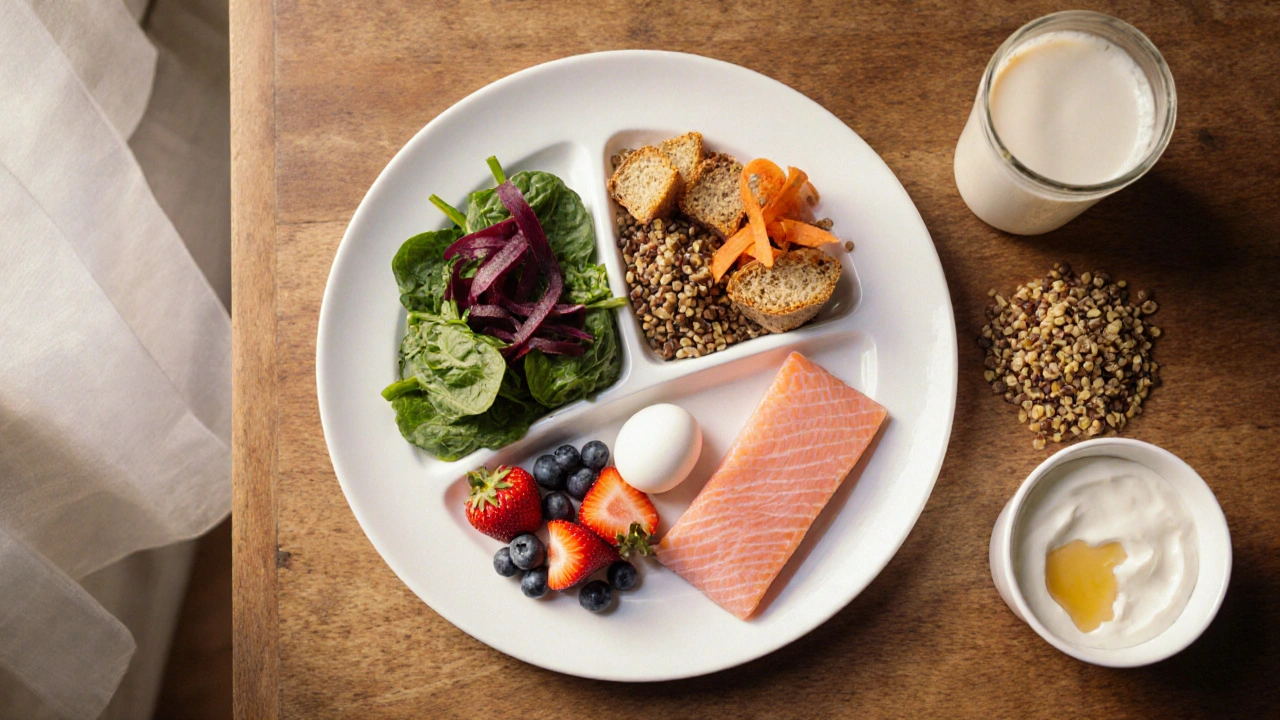Pregnancy Nutrition: Essential Guidance for a Healthy Mom and Baby
When planning pregnancy nutrition, the set of dietary habits and nutrient needs a woman follows during pregnancy to support both her own health and her developing baby. Also known as prenatal diet, it plays a pivotal role in fetal growth and maternal wellbeing.
One key component of prenatal vitamins, supplements that fill nutrient gaps like folic acid, iron, and DHA is folic acid, which helps prevent neural tube defects. Another essential element is the overall maternal diet, the daily food choices providing calories, protein, healthy fats, and micronutrients. A balanced maternal diet directly influences fetal development, the process of organ formation and growth inside the womb, especially brain and bone formation.
Managing gestational weight gain, the amount of weight a pregnant person should gain based on pre‑pregnancy BMI requires monitoring macronutrient distribution and activity level. Excessive gain can increase the risk of gestational diabetes, while insufficient gain may limit fetal growth. Combining appropriate calorie intake with regular, low‑impact exercise supports healthy weight trajectories.
Key Nutrients to Focus On
By mastering pregnancy nutrition, you give your baby the best start. First, aim for at least 400–800 µg of folic acid daily until the end of the first trimester. Iron needs rise to about 27 mg per day; pair iron‑rich foods like lean red meat with vitamin C sources to boost absorption. Calcium (1,000 mg) supports bone formation—think dairy, fortified plant milks, and leafy greens. DHA, an omega‑3 fatty acid, contributes to brain development; two servings of low‑mercury fish each week meet the recommendation.
Hydration is often overlooked. Pregnant bodies need about 2.5–3 L of fluids daily, including water, herbal teas, and soups. Proper hydration assists nutrient transport, prevents constipation, and eases swelling. If you’re struggling with morning sickness, sip small amounts frequently and add a pinch of ginger to your tea.
Food safety matters more during pregnancy. Avoid raw or undercooked meats, unpasteurized dairy, and high‑mercury fish such as shark or swordfish. Wash fruits and vegetables thoroughly to reduce the risk of listeria or toxoplasmosis, which can harm the fetus.
Many expectant mothers wonder about caffeine. Moderate intake (up to 200 mg per day, roughly one 12‑oz coffee) is generally considered safe, but higher amounts have been linked to lower birth weight. If you’re sensitive, switch to decaf or herbal alternatives that are pregnancy‑approved.
Weight‑gain guidelines differ by pre‑pregnancy BMI. Underweight individuals (BMI < 18.5) may aim for 28–40 lb, while those with a normal BMI target 25–35 lb. Overweight (BMI 25‑29.9) should limit gain to 15–25 lb, and obesity (BMI ≥ 30) to 11–20 lb. Tracking weekly weight helps stay within these ranges and signals if dietary adjustments are needed.
Meal planning can keep you on track. Prepare balanced plates: half vegetables, a quarter lean protein, and a quarter whole grains. Snack smartly with nuts, Greek yogurt, or fruit paired with nut butter to keep blood sugar steady and curb cravings.Physical activity supports both nutrition and mood. The American College of Obstetricians and Gynecologists recommends at least 150 minutes of moderate aerobic exercise weekly, unless contraindicated. Walking, swimming, and prenatal yoga improve circulation, reduce swelling, and help manage stress.
Mindful eating helps you listen to hunger cues and avoid overeating. Eat slowly, chew thoroughly, and put utensils down between bites. This practice also reduces heartburn, a common pregnancy complaint.
Address common myths early. Some believe “eating for two” means doubling portions, but excess calories can lead to unnecessary weight gain. Instead, focus on nutrient density—choose foods that pack vitamins and minerals without excess added sugars or fats.
Finally, regular check‑ups let your healthcare provider monitor iron, vitamin D, and blood sugar levels, adjusting your nutrition plan as needed. Open communication ensures any deficiencies are caught early and addressed with diet or supplements.
Below you’ll find a curated collection of articles that dive deeper into each of these topics, offering detailed guides, comparison charts, and practical tips to help you implement a solid pregnancy nutrition plan.

Essential Pregnancy Nutrition: What to Eat for a Healthy Baby
Oct, 12 2025
